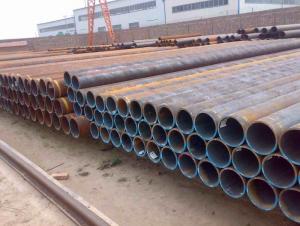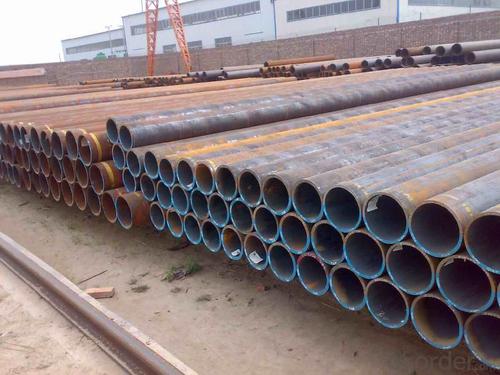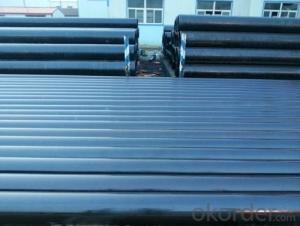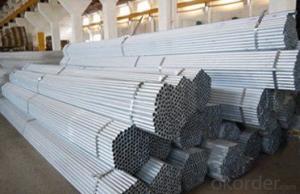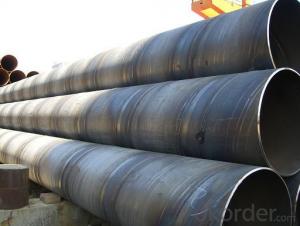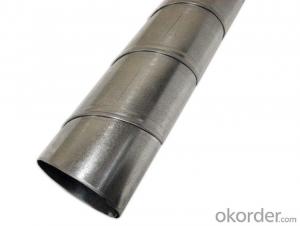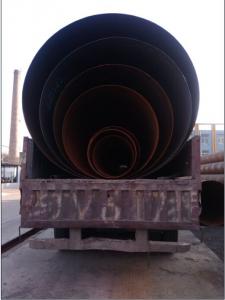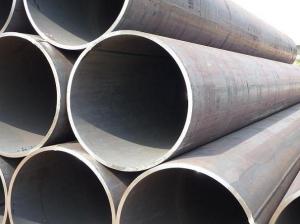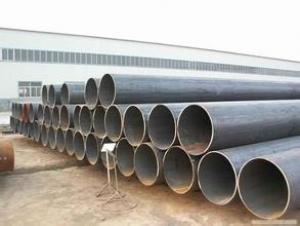BS, JIS, GB, DIN, ASTM Carbon Welded Spiral Steel Pipe
- Loading Port:
- Tianjin
- Payment Terms:
- TT or LC
- Min Order Qty:
- 20 m.t.
- Supply Capability:
- 15000 m.t./month
OKorder Service Pledge
OKorder Financial Service
You Might Also Like
1、Structure of Welded Steel Tube:
Our products are strictly in accordance with international and domestic standard. We test on every pipe before delivery. Any quality certification or testing report you want to see, please tell us. Welded Steel Tube is formed by drawing a solid billet over a piercing rod to create the hollow shell. We are company that have many years experience and professional manager team and engineer team and sales team, sure we will provide you high quality of welded pipe and professioanl service. We aim to be your career partner and hope to establish long-term business cooperation with you.
2、Main Features of the Welded Steel Tube:
• High manufacturing accuracy
• The higher strength
• The small inertia resistance
• Strong heat dissipation ability
• Good visual effect
• Satisfy price
3、Welded Steel Tube Specification:
Standard | GB, DIN, ASTM ASTM A106-2006, ASTM A53-2007 |
Grade | 10#-45#, 16Mn 10#, 20#, 45#, 16Mn |
Thickness | 8 - 33 mm |
Section Shape | Round |
Outer Diameter | 133 - 219 mm |
Place of Origin | Shandong, China (Mainland) |
Secondary Or Not | Non-secondary |
Application | Hydraulic Pipe |
Technique | Cold Drawn |
Certification | API |
Surface Treatment | factory state or painted black |
Special Pipe | API Pipe |
Alloy Or Not | Non-alloy |
Length | 5-12M |
Outer Diameter | 21.3-610mm |
Grade | 20#, 45#, Q345, API J55, API K55, API L80, API N80, API P110, A53B |
Standard | ASME, ASTM |
1) Material:20#(ASTM A 106/A53 GRB.API5LGRB,GB),45#,16Mn,10#.
2) Specification range:OD:21.3-610mm,WT:6-70mm,length:6-12m or according to the requirement of clients.
3) Excutive standards:GB,ASME API5L.ASTM A 106/A53,Despite of the above standards,we can also supply seamless steel pipe with standard of DIN,JIS,and so on,and also develop new products according to the requirements of our clients!
4) Surface:black lacquered,varnish coating or galvanized.
5) Ends:Beveled or square cut,plastic capped,painted.
6) Packing:bundles wrapped with strong steel strip,seaworthy packing.
4、Packaging & Delivery
Packaging Details: | seaworthy package,bundles wrapped with strong steel strip |
Delivery Detail: | 15-30days after received 30%TT |
5、FAQ of Welded Steel Tube:
①How is the quality of your products?
Our products are strictly in accordance with international and domestic standard. We test on every pipe before delivery. Any quality certification or testing report you want to see, please tell us.
Guaranteed: If products’ quality is not in accordance with description as we provide or the promise before you place order, we promise 100% refund.
②How about the price?
Yes, we are factory and be capable of offering you the lowest price. One of our policy is that “ to save time and be absolutely honest with our business relationship, we quote as low as possible for every client, and discount can be given according to the quantity”, if you are interested in bargain and dissatisfy our factory price, just don’t waste your time. Our quotation is professional.
③Why should you choose us?
Choice happens because of our quality and price. Additionally, we can also offer professional products inquiry, products knowledge train (for agents), fast goods delivery, outstanding customer solution proposals. Our service formula: good quality + good price + good service=customer’s trust.
SGS test is available. Customer inspection before shipping is welcome. Third party inspection is OK.
6、 Welded Steel Tube Images:
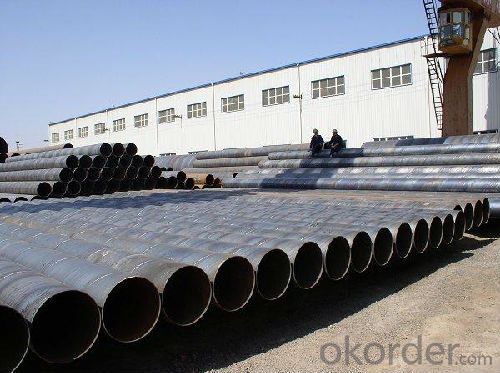
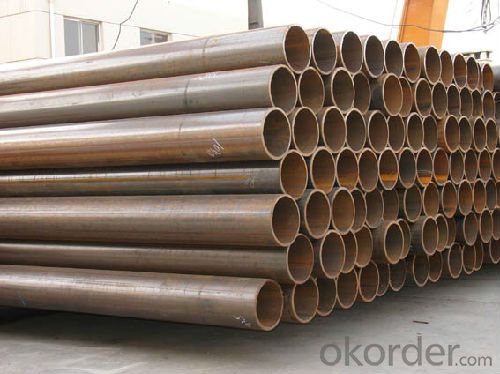
- Q: What are the different sizes of steel pipe nipples?
- The sizes of steel pipe nipples vary depending on their intended use and application. Common sizes include 1/8", 1/4", 3/8", 1/2", 3/4", 1", 1 1/4", 1 1/2", and 2". However, there are many other sizes available to cater to specific needs and requirements.
- Q: What is the standard length of a steel pipe?
- The standard length of a steel pipe can vary depending on the application and industry, but commonly it ranges from 18 to 24 feet.
- Q: DN80 seamless steel tube, what is the standard thickness?
- Commonly used DN80 seamless steel pipe caliber should be 89mm*4mm.
- Q: What are the common applications of steel pipes in the oil and gas industry?
- Steel pipes are commonly used in the oil and gas industry for various applications such as drilling, transportation of crude oil and natural gas, and for constructing pipelines and storage tanks. They provide strength, durability, and resistance to corrosion, making them ideal for these critical operations.
- Q: What are the factors to consider when designing a steel pipe system?
- When designing a steel pipe system, several factors need to be considered. Firstly, the intended purpose of the system and the materials that will be transported through it are crucial. This determines the required pipe diameter, thickness, and material type to ensure compatibility and prevent corrosion or leakage. Secondly, the operating conditions, such as temperature, pressure, and flow rate, must be examined to select pipes with suitable strength and resistance properties. Additionally, factors like environmental conditions, including soil characteristics and exposure to chemicals or natural elements, should be evaluated to determine the necessary protective coatings or insulation. Lastly, considerations like installation requirements, regulatory compliance, and maintenance accessibility should be taken into account to design a practical and efficient steel pipe system.
- Q: Are steel pipes resistant to UV radiation?
- Generally, steel pipes have resistance to UV radiation. UV radiation is known to cause damage to materials over time, resulting in fading, discoloration, and degradation. However, steel pipes usually have protective layers, such as paint or galvanization, that help shield them from UV radiation. These coatings act as a barrier, preventing direct exposure of the steel to UV rays and minimizing potential damage. Furthermore, steel's inherent properties, including strength and durability, make it less susceptible to the effects of UV radiation compared to materials like plastics or rubber. Nevertheless, it is important to note that prolonged exposure to intense UV radiation can still have some impact on steel pipes, such as slight discoloration or surface degradation. To ensure the continued performance and longevity of steel pipes in outdoor or UV-exposed environments, regular maintenance and inspection are recommended.
- Q: What is the difference between Schedule 40 and Schedule 80 steel pipes?
- The main difference between Schedule 40 and Schedule 80 steel pipes is their wall thickness. Schedule 80 pipes have a thicker wall compared to Schedule 40 pipes, making them more suitable for high-pressure applications and heavy-duty industrial use.
- Q: How are steel pipes protected against external damage?
- Steel pipes are protected against external damage through various methods such as coatings, wraps, and cathodic protection. These protective measures help prevent corrosion, abrasion, and other forms of external damage, ensuring the durability and longevity of the pipes.
- Q: Can steel pipes be used for culvert applications?
- Yes, steel pipes can be used for culvert applications. Steel pipes are commonly used for culverts due to their durability, strength, and resistance to corrosion. They can withstand heavy loads and are able to handle high traffic volumes and large water flows. Additionally, steel pipes can be easily manufactured in various sizes and shapes to suit specific culvert requirements. Their longevity and low maintenance needs make them a cost-effective choice for culvert applications.
- Q: Can steel pipes handle extreme weather conditions?
- Yes, steel pipes are known for their ability to handle extreme weather conditions. Steel is a durable and strong material that can withstand harsh environmental elements, including extreme temperatures, high winds, heavy rainfall, and even extreme weather events like hurricanes and tornadoes. Steel pipes are commonly used in various industries and applications, such as water and sewage systems, oil and gas pipelines, and construction projects, precisely because of their resilience and ability to withstand extreme weather conditions. Additionally, steel pipes can be coated or treated to enhance their resistance to corrosion, further increasing their ability to handle extreme weather conditions.
Send your message to us
BS, JIS, GB, DIN, ASTM Carbon Welded Spiral Steel Pipe
- Loading Port:
- Tianjin
- Payment Terms:
- TT or LC
- Min Order Qty:
- 20 m.t.
- Supply Capability:
- 15000 m.t./month
OKorder Service Pledge
OKorder Financial Service
Similar products
Hot products
Hot Searches
Related keywords
